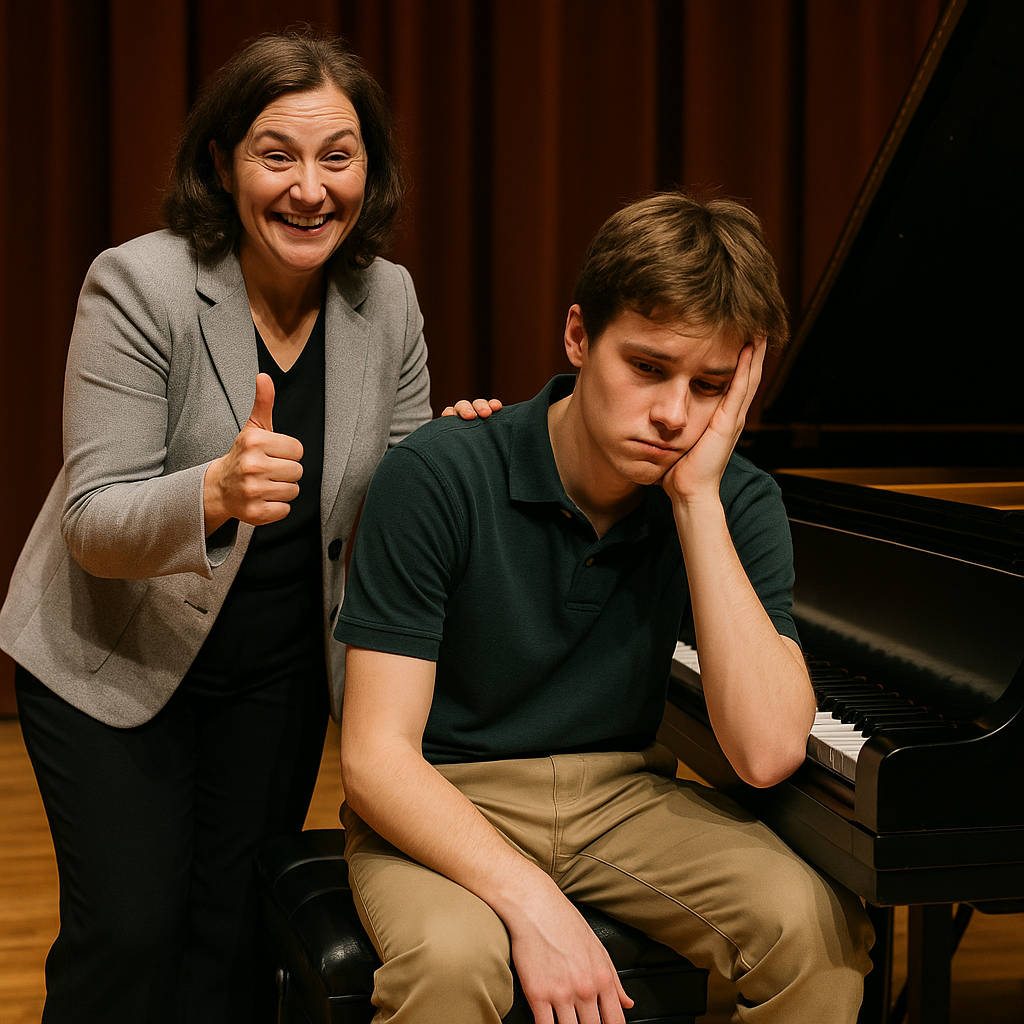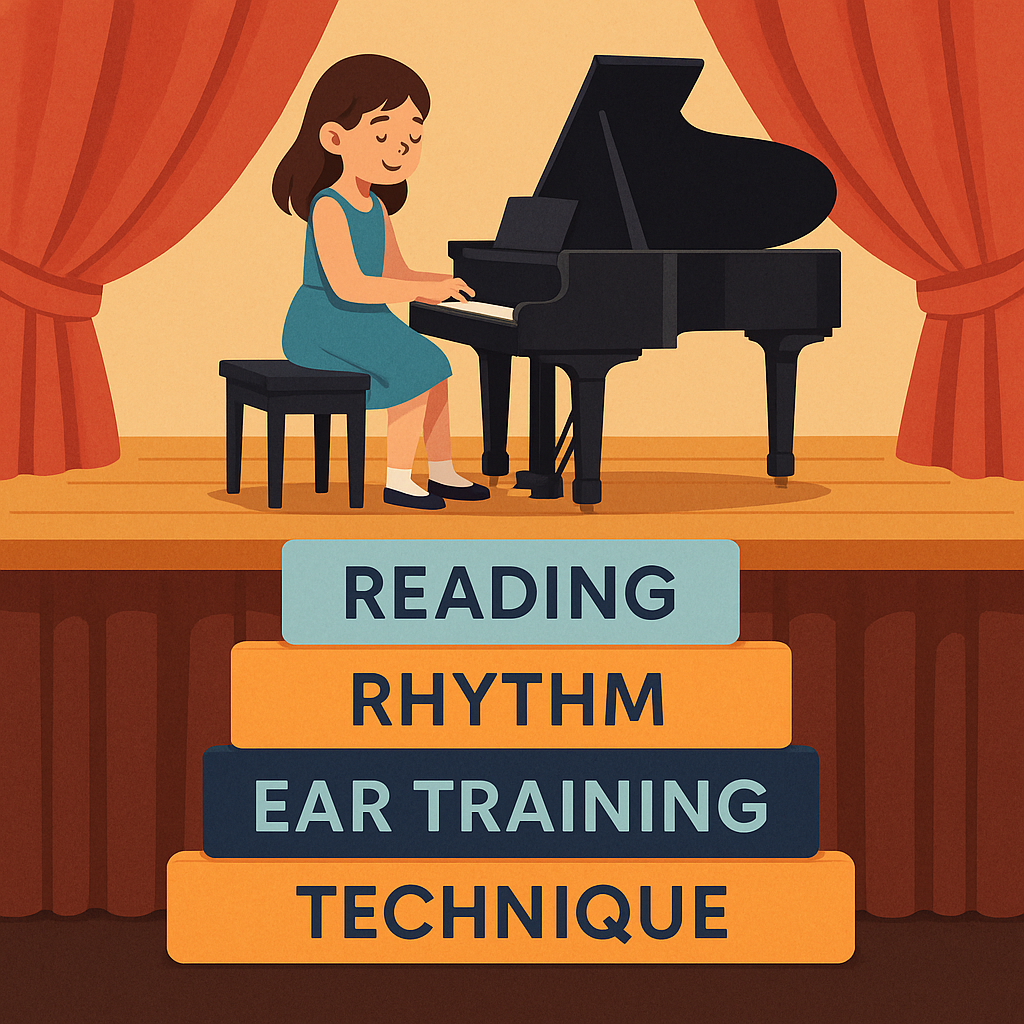The Role of Performance in Piano Education

If you’re a parent with a child in piano lessons, chances are you’ve attended your fair share of recitals—or maybe even nervously sat through a competition or festival performance. These events can be exciting, nerve-wracking, and inspiring all at once. They’re an important part of learning music—but they’re not the whole point.
At Piano Marvel Academy, we believe that performance should be a natural extension of a well-rounded music education—not the entire focus.
That might sound surprising. After all, isn’t performing what music lessons are for?
Well—yes and no.
Performing is a wonderful way for students to celebrate what they’ve learned, to build confidence, and to share their progress with others. But when performance becomes the only focus—when everything revolves around preparing for one recital or contest after the next—it can actually slow down a child’s musical growth.
Here’s why that matters:
1. Learning Music Is About More Than One Piece
“Performance should be a natural extension of a well-rounded music education, not the entire focus.”
-
Some teachers have students spend several months (or even years) on a single recital piece, polishing it for one big moment.
-
In the process, they often miss out on:
-
Sight reading
-
Rhythm counting
-
Music theory
-
Ear training
-
Creativity and improvisation
-
🧠 Over the years, I’ve taught many transfer students who could perform advanced music…
Yet their sight-reading skills are far below their performance level and they struggle with basic rhythm counting.
When I asked how they learned their past repertoire, the gist of their answer was often:
“My teacher taught it to me by rote—bit by bit over months or even years.”
That kind of approach might lead to applause on stage…
But it doesn’t create confident, independent musicians.
🔎 My own research has shown that when students go too long without regularly learning new music (especially through reading), their sight-reading skills drop significantly.
2. Competitions Should Serve the Student, Not the Teacher
In some programs, students are pushed into competitions primarily to win awards—not because it’s the best path for their learning. These situations often bolster the teacher’s reputation more than they benefit the student.
That can create a lot of pressure and make music feel more like a performance for someone else, rather than a joyful, personal journey. At worst, it can (and often does) lead to burnout. Once again, this does not create life-long musicians.

3. The Best Performances Come from a Strong Foundation

-
When students build skills gradually and consistently, performances become natural.
-
Instead of cramming and memorizing, they:
-
Understand what they’re playing
-
Feel confident
-
Share music with expression and joy
-
Our Philosophy
Yes, we do recitals.
Yes, we celebrate performances.
But we prioritize progress.
We believe every student deserves a balanced music education that supports their growth over time. Performing is part of that—but it must fit within the appropriately steady, day-to-day learning that happens in lessons and at home.
That’s why we created our Level Up Celebrations—a unique way to recognize and reward students not just for what they can perform, but for how they’re growing. These milestones aren’t based on just one piece or one moment. Instead, they celebrate well-rounded progress: sight reading, rhythm, technique, creativity, and consistent effort over time.
When you see your child on stage at one of our events—or receiving a new medallion at a Level Up Celebration—you’re not just seeing a performance. You’re witnessing the sum of weeks, even months, of deep learning, problem-solving, discipline, and joy.
That’s what we celebrate.
.

About the Author
Joshua Harris, a TEA-certified, background-checked, and TIA-Designated Exemplary Teacher, was hand-picked by Piano Marvel to establish the first Piano Marvel Academy in Texas. With 18 years of experience in music education—including 10 years as a class piano teacher at the award-winning Talkington School for Young Women Leaders in Lubbock ISD, which is still using his innovative system to drive the success of their piano program. His approach fosters a mutually respectful and fun environment, focusing on helping each student achieve their personal best every day.